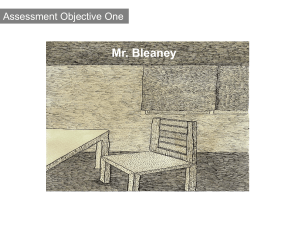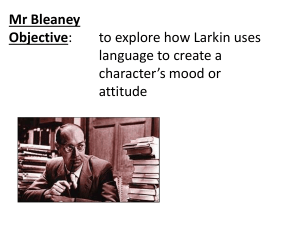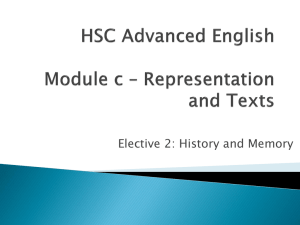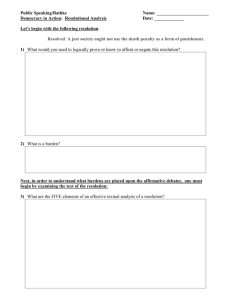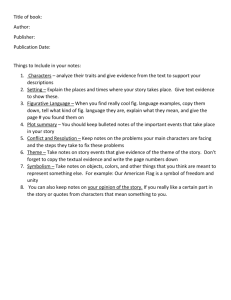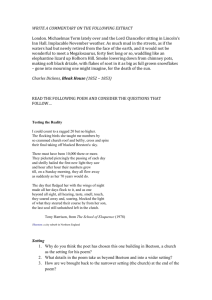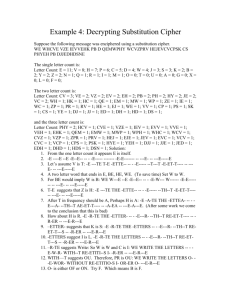higher – textual analysis
advertisement
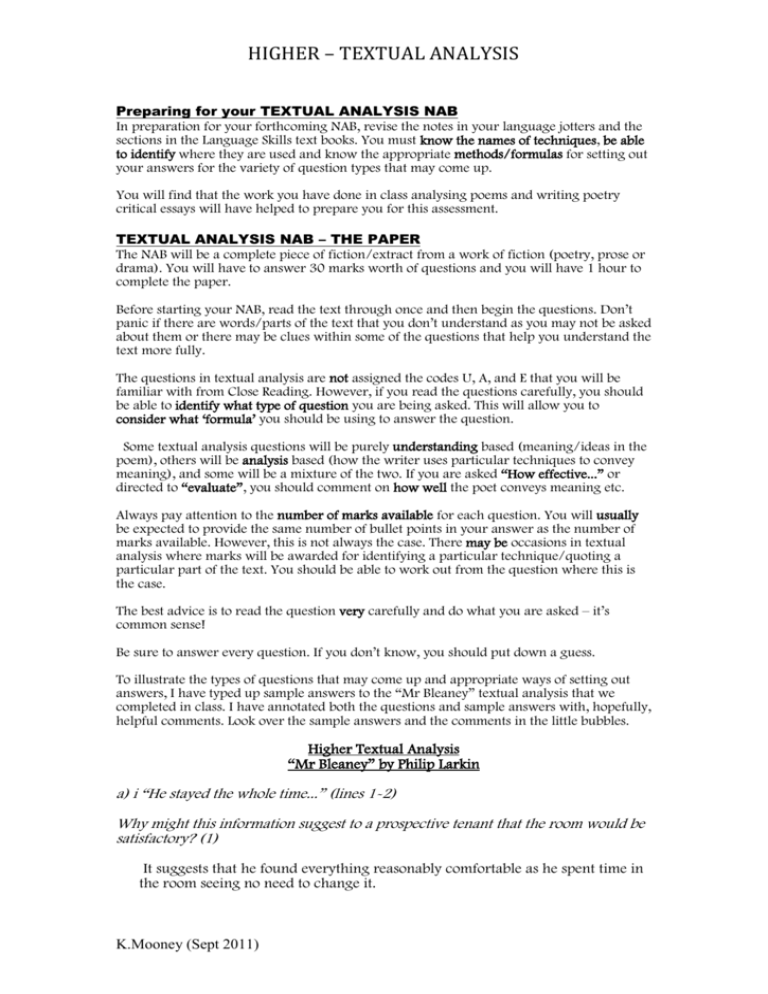
HIGHER – TEXTUAL ANALYSIS Preparing for your TEXTUAL ANALYSIS NAB In preparation for your forthcoming NAB, revise the notes in your language jotters and the sections in the Language Skills text books. You must know the names of techniques, be able to identify where they are used and know the appropriate methods/formulas for setting out your answers for the variety of question types that may come up. You will find that the work you have done in class analysing poems and writing poetry critical essays will have helped to prepare you for this assessment. TEXTUAL ANALYSIS NAB – THE PAPER The NAB will be a complete piece of fiction/extract from a work of fiction (poetry, prose or drama). You will have to answer 30 marks worth of questions and you will have 1 hour to complete the paper. Before starting your NAB, read the text through once and then begin the questions. Don’t panic if there are words/parts of the text that you don’t understand as you may not be asked about them or there may be clues within some of the questions that help you understand the text more fully. The questions in textual analysis are not assigned the codes U, A, and E that you will be familiar with from Close Reading. However, if you read the questions carefully, you should be able to identify what type of question you are being asked. This will allow you to consider what ‘formula’ you should be using to answer the question. Some textual analysis questions will be purely understanding based (meaning/ideas in the poem), others will be analysis based (how the writer uses particular techniques to convey meaning), and some will be a mixture of the two. If you are asked “How effective...” or directed to “evaluate”, you should comment on how well the poet conveys meaning etc. Always pay attention to the number of marks available for each question. You will usually be expected to provide the same number of bullet points in your answer as the number of marks available. However, this is not always the case. There may be occasions in textual analysis where marks will be awarded for identifying a particular technique/quoting a particular part of the text. You should be able to work out from the question where this is the case. The best advice is to read the question very carefully and do what you are asked – it’s common sense! Be sure to answer every question. If you don’t know, you should put down a guess. To illustrate the types of questions that may come up and appropriate ways of setting out answers, I have typed up sample answers to the “Mr Bleaney” textual analysis that we completed in class. I have annotated both the questions and sample answers with, hopefully, helpful comments. Look over the sample answers and the comments in the little bubbles. Higher Textual Analysis “Mr Bleaney” by Philip Larkin a) i “He stayed the whole time...” (lines 1-2) Why might this information suggest to a prospective tenant that the room would be satisfactory? (1) It suggests that he found everything reasonably comfortable as he spent time in the room seeing no need to change it. K.Mooney (Sept 2011) HIGHER – TEXTUAL ANALYSIS a ii) From the poem, pick out three pieces of the description of the room which suggest it is not however very comfortable. Explain briefly why each example suggests this. (3) “Curtains fall to within five inches of the sill” means the curtains are too short and so they do not fit the room. The fact that they have not been especially made or chosen suggests that the room is uncared for. “Curtains thin and frayed” means that the material is unsubstantial and in fact is worn away. This suggests that the room is tatty and unloved. “upright chair” denotes that the chair offers a straight back. This suggests it is uncomfortable as it cannot be moved into a more relaxing position and so the room is uncomfortable. b) Read the lines describing the view from the room (lines 5-6). What does the description of the view add to your general impression of the room? (2) The view is that of a building site that is covered in little clumps of untidy grass. The fact that there is nothing attractive about the view – indeed it is quite depressing – adds to the sense that the room is really most uninviting. c) “Mr Bleaney took/My bit of garden properly in hand.” (Lines 6-7) Why might this piece of information be off-putting to the prospective tenant? (2) Mr Bleaney had taken responsibility for the woman’s garden and ensured it was kept tidy. This may cause the worry that the expectation is there that a future tenant may be expected to do the same. d) “I’ll take it” (Line 10) Suggest two ways in which the poet makes these words stand out and come as a surprise. (2) Stand out - It is positioned at the start of a line and is in a very short and straight forward sentence. Come as a surprise – The words follow a long list of uncomfortable and depressing features of the room. We would think this would put him off and are so surprised when the dash introduces the comment that ‘I’ll take it’. e) Read again lines 10-14: “So it happens...on to buy”. Give one example of the poet’s use of sound to convey the tenant’s irritation with the noise. Explain your example. The onomatopoeia “jabbering” is effective in suggesting the incessant stream of unimportant conversation that is no more than a painful noise. K.Mooney (Sept 2011) HIGHER – TEXTUAL ANALYSIS f) Read lines 15-20: “I know...Stoke.” Explain two of the following ways in which the poet suggests the tediousness of the landlady’s talk of her old tenant: (i) sentence structure (ii) punctuation (iii) the arrangement of the poem into lines (4) Sentence Structure A list (“what time he came down...at the four aways”) of the many mundane parts of his routine that she has observed is included to illustrate the boring nature of his life. Linking words are used to introduce supplementary information. “Likewise” indicates she is going on to offer similarly unimportant information and the use of ‘and’ at the start of line 20 draws attention to the fact that the list goes on for a long time. Arrangement of the poem into lines Enjambment of lines 16-17 (“for sauce to gravy, why/He kept on...”) means that the list is split over 2 stanzas. This gap on the page between the lines suggests that the list goes on for a long period of time and it would seem that it is never ending for the listener. The enjambment mentioned above, between lines 16 and 17, means that the line continues without the caesura that may be expected at the end of line 16. This suggests that there is no break from the nonstop chatting of the woman as the poet doesn’t come to a break. g) Read lines 21-28 carefully. The tenant has just claimed he knows all about Mr Bleaney’s habits. In your own words, explain what he does not know about Mr Bleaney. (2) He doesn’t know Mr Bleaney’s true feelings about the room. For example, Bleaney may have thought about the room being representative of the very little he had to show for his life. Bleaney may have been afraid of the fact that he had so little as this was all he really deserved. h) Explain what the poet means by: “How we live measures our own nature.” (Line 25) (2) Our behaviour in life and the environment we create for ourselves/ is representative of who we are. i) How effective is the poet’s portrait of Mr Bleaney himself? You should refer to some of the following in your answer: (4) ‘He stayed/The whole time’ ‘He was at the Bodies’ ‘till/They moved him’ ‘Mr Bleaney took/ My bit of garden properly in hand’ K.Mooney (Sept 2011) HIGHER – TEXTUAL ANALYSIS ‘The jabbering set he egged her on to buy’ ‘I know his habits’ ‘He kept on plugging at the four aways’ ‘The frinton folk/Who put him up for Summer holidays,/And Christmas at his sister’s house in Stoke’ ‘one hired box’ We get a very clear sense of Mr Bleaney’s personality and the lifestyle that he leads. “He stayed/the whole time” means he was constantly in the small rented room. This suggests that his life was boring and he lacked the drive to do anything. “He was at the Bodies” means he was at the car factory of this name. However, the word itself connotes death and the idea that when life is gone we are no more than a body. This suggests that Mr Bleaney is merely existing rather than living. “I know his habits” means that his behaviour was full of predictable routines. This suggests that he leads a dull and repetitive life. “one hired box” is a reference to the room that he let. ‘One’ emphasises that this is his sole living space and so is indicative of his solitary existence, while ‘box’ denotes a regularly shaped and relatively small space and therefore connotes the how limited his living quarters are. j) In the last two verses (lines 21-28) the tenant is considering not just Mr Bleaney, but how his own life has turned out. How does the poet convey a sense of loneliness, depression and low self-esteem? You should refer to language as well as ideas in your answer. (4) As we are told that he has agreed to take the room, we are aware that the speaker is now becoming the next Mr Bleaney and so the negative comments about Bleaney’s existence can be seen as a comment on himself – he knows that the room will come to represent himself. The description of the weather that he imagines being observed out the room window “frigid wind tousling the clouds” is significant. Frigid means unfriendly or cold and this wind ‘tousling’ the clouds means the clouds are disturbed or unsettled by it. This dull weather suggests he is left similarly unsettled and depressed. ‘one hired box’ means a small room that is only hired and so is not even a possession. This suggests he has very little as it stresses only one room and the fact that he mentions ‘hired’ means he sees himself as a failure having no possessions and he is isolated/ boxed in in his one room. He says ‘pretty sure’ when commenting on the fact that Bleaney deserved these surrounding. Such certainty would come from seeing himself as similar to Bleaney and deserving the same. This suggests low self-worth. k) The name ‘Bleaney’ sounds like a humorous amalgamation of the words ‘bleak’ and ‘mean’, in the sense of small and insignificant. K.Mooney (Sept 2011) HIGHER – TEXTUAL ANALYSIS Why do you think Larkin chose the name as the title of the poem? Could it have a wider significance than just the name of the old tenant? (2) ‘Bleak’ and ‘mean’ connote the small and insignificant existence that the character of Bleaney has – everything for him is routine and dull. These words also apply to the uncared for and poor living conditions which Bleaney lived in. It could would be a fitting name for the narrator too as he is about to start living the same dull existence as the character he describes. K.Mooney (Sept 2011)
